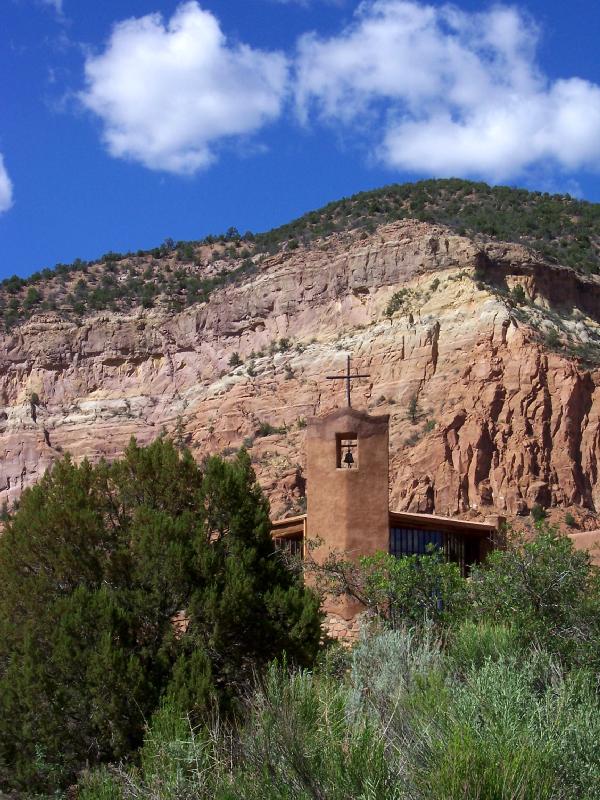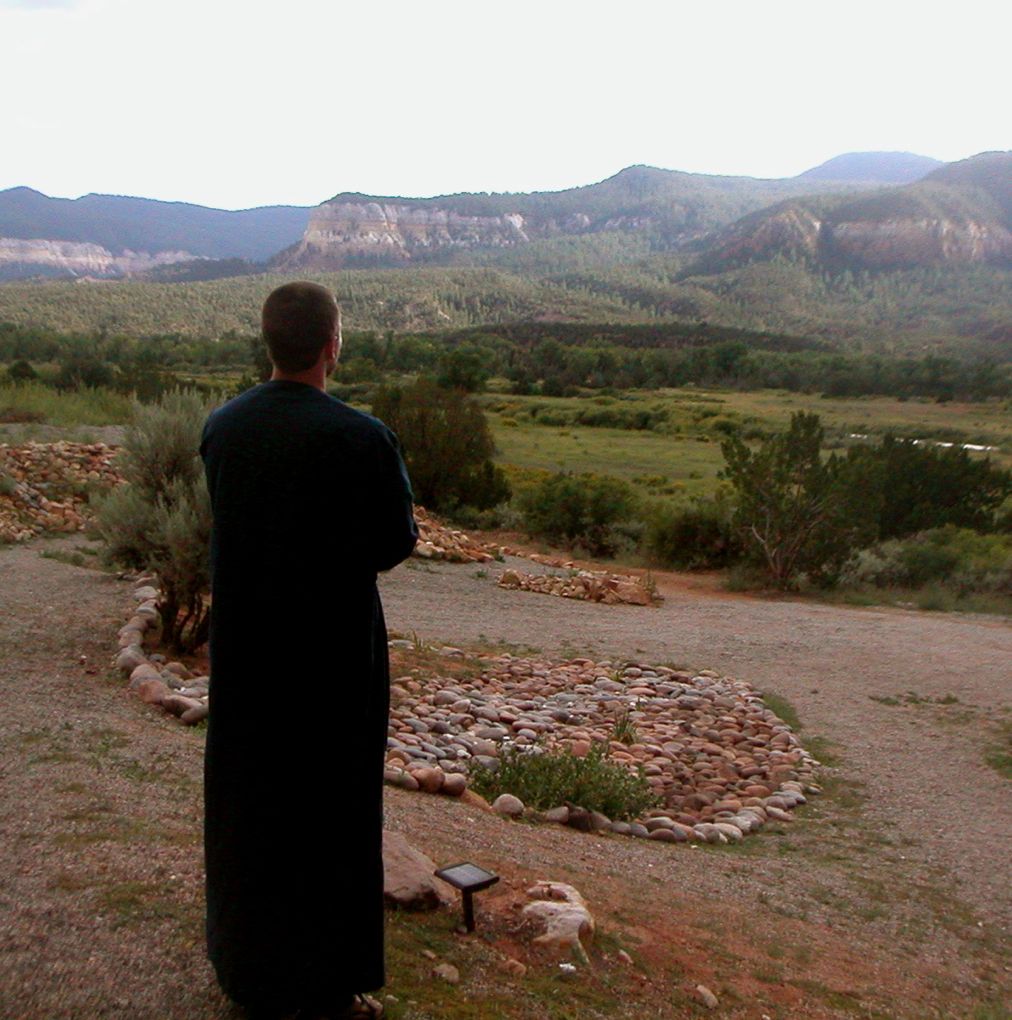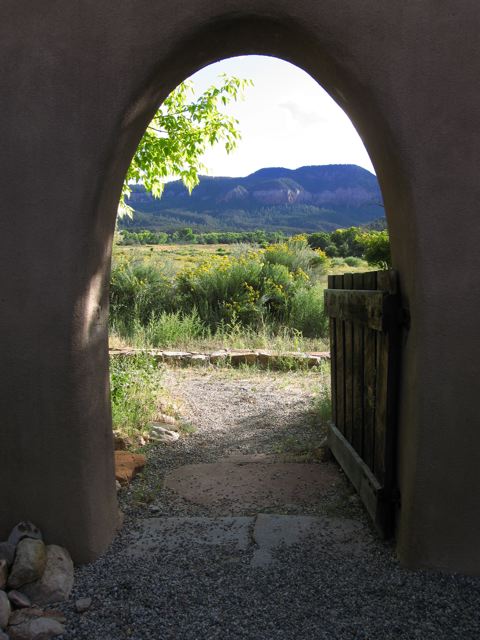
Why I go to the monastery

Here’s something about me that even my close friends often don’t realize: I’m a closet introvert. Now don’t get me wrong, it’s not that people bug me or that my palms get sweaty when I’m around a crowd. I genuinely love people. I love being with people and in the presence of people. But that’s not what energizes me. Solitude is. And that’s why I need plenty of “monk time.”
I get this a number of ways. Sometimes I’ll take a silent walk around the block, eat dinner alone in my room, or pencil into my calendar a morning to spend by myself. Those are the little monk times I carve into my normal schedule. But I also get extended monk time…literally. Once a year I stay a couple of weeks at a Roman Catholic monastery tucked away in the desert and canyons of New Mexico. It’s the most remote monastery in North America – a three hour drive from the nearest major airport and a driveway that alone takes 45 minutes.
I’ve just returned from my annual retreat there. And considering that I spent the previous month on the road (Missouri to England to Florida to Texas) and with people almost around the clock, I needed some good monk time. One of the brothers there, a good friend of mine, is putting together something for their website and asked me to write a few sentences responding to the question, “Why do you come to the monastery?” This was my answer:
“The busyness and noisiness of the world make it easy to live a distracted and shallow existence. I come to the monastery because I want to live deeply. My annual retreat is spent remembering and reflecting on that which is at the center of life – God, gospel, and kingdom. The stillness of the canyons, the silence of the desert, and the simplicity of the brothers always help me get back to these basic, fundamental truths.”
I recently read a columnist of the New York Times who says we’ve left the Information Age and have now entered “the Age of Interruption.” All we do these days is interrupt one another (and ourselves) with emails, cell phone calls, text messages, instant messages, tweets, and Facebook pokes (the goofiest of them all). And if you think you can avoid all these interruptions by reverting to the “purist” days of no cell phones or Facebook, then think again. The moment you step on a bus, train, or into a restaurant your purist bubble is popped by someone else’s cell phone ringing a Beyoncé song or the theme from Mission Impossible. You don’t even need your own interruptions; those around you have plenty to share.
Closely connected to this is the so-called skill of multitasking. (Okay, a confession: after settling into my room at the monastery I turned on my laptop to find I had left it with ten windows open, one being an internet browser with seven different tabs!) It’s quite clear why our generation loves to multitask: we think we can get more done in less time. Whether or not that’s actually true (I and a bunch of scientists would contend it’s not), there’s a dark side to multitasking that must be considered: it chips away at us being “whole” persons. Doing something over here while your mind is thinking about something else over there doesn’t mean you’re in both places; it means you’re in neither place.
Even if multitasking does make us more efficient, it comes at the high cost of making us fragmented persons. Mix some old-fashioned American pragmatism with globalization’s new technological savvy and we’re well on our way toward becoming a machine-like people: highly active but no depth.

God’s love as divine therapy
When people ask what I do while at the monastery I tell them I shave my head, wear a robe, and just let God love on me. It’s the last of these – giving God the space and time to love on me – that helps bring me back to my true self. I have a playful spirit about me while there: I journal, read, take long walks with God, and sing songs to him. And all this has quite a healing effect on me. My friends even notice a difference when I return. They tell me I’m more considerate and a better listener. God’s love is divine therapy, and when experienced in large doses it can take a fragmented self and make it whole again.
One of the spiritual exercises I practice at the monastery is Centering Prayer. Unlike other forms of Christian prayer and meditation, the goal of Centering Prayer is to become completely detached from all thinking in order to be totally open to God. Practically speaking, this means sitting in silence for twenty minutes (that’s the suggested length). If the 16th century monk St. John of the Cross was right that “Silence is God’s first language,” then Centering Prayer simply creates room to meet with God and bask in the warmth of his love.
You might be thinking, “twenty minutes is a long stinkin’ time to sit still.” Yep, it sure is. And sometimes it feels like nothing is happening. In those moments I think back to something I read in Cynthia Bourgeault’s Centering Prayer and Inner Awakening, a book my friends in Kansas City gave me. Bourgeault says that what takes place in the silent depths during Centering Prayer “is no one’s business, not even your own; it is between your innermost being and God…Your own subjective experience of the prayer may be that nothing happened…but in the depths of your being, in fact, plenty has been going on, and things are quietly but firmly being rearranged.”
Her counsel is that when you catch yourself thinking, simply let the thought go and return to an openness before God, and she suggests choosing a sacred word to silently repeat whenever you need to push away an invading thought. One of the first mornings at the monastery I chose “Abba” as my word, then sat down and began praying. This sacred word became part of my breathing; every time I inhaled, it repeated in my mind. But about halfway through the prayer my word changed. And it changed into a whole sentence: “Be still and know that I am God.” I remember Richard Rohr saying he uses this verse to draw himself into a contemplative frame of mind. Here’s his prayer:
Be still and know that I am God.
Be still and know that I am.
Be still and know.
Be still.
Be.
Rohr’s exercise must have been in the back of my mind because I soon found myself slowly walking down these stairs of sentences until I arrived at “Be.” This one syllable became my prayer, but actually it felt more like God’s prayer to me. God knew that he didn’t yet fully have me because my mind was still all over the place. (Remember the ten open windows on my laptop?) His message to me was that one gentle word – Be. He wanted me to Be present in one place so that he could meet with me instead of some fragment of who I am.
I had some creative ideas, as well as wonderful memories I hadn’t thought of in some time, enter my mind while I sat there silently. My natural reaction was to make mental notes of these thoughts so that I could write them down afterward and not forgot them. (This is one of the reasons I take a pencil and paper in my pocket everywhere I go – I often get some of my most creative ideas when away from my desk.) But making mental notes, even small ones, pulls me away from the act of sitting only in openness to God.
So whenever I caught myself doing mental note-taking I would gently remind myself that this is not the time to reflect on the past or project for the future; now is the time to Be in the present and nothing more. I’d let go of the thought and it would pass as quickly as it had come - and as it left my mind, ease would fill its place.
When the twenty minutes ended my alarm clock went off, and for the first time since arriving I felt relaxed and fully present. The subtle anxiety I had unknowingly been carrying around (for no telling how long) had finally given way. More and more I’m learning just how desperately I need times of intentional silence in my life. Blaise Pascal once wrote, “All of man’s troubles result from his inability to sit in a room alone.”
The beautiful paradox
My monk time is not only divine therapy, however; it’s also where I tap into divine energy. I spent my evenings reading about the monastery’s history in a book titled Brothers in the Desert. The priest and monk Aelred Wall founded the monastery in 1964, and in an interview that same year he said he believed the monks and guests who would come to the new monastery would “not turn their backs on the world; they would leave it to re-enter it at a deeper level.”
Herein lies the beautiful paradox. I retreat from the world and enter the monastery to be revived and renewed, but ultimately my time in the monastery is not for me…it’s for the world. Monk time energizes me to love others and live in community – and that’s crucial since wealth in God’s economy is measured in love and relationship.
I’m deeply convicted that my work is in the world, to serve those who live in the city. But I’m also deeply convicted that doing this work well requires I leave the world and come to the monastery regularly. If I want to be with others meaningfully, I cannot neglect my monk time.
As multitaskers living in the Age of Interruption, maybe having a bit more monk time in our lives could go a long way.
